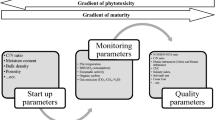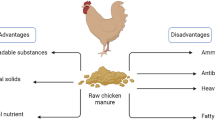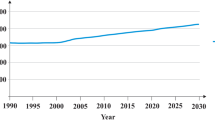Abstract
Purpose
The objectives of the present paper were to (1) investigate the effect of compost tea on pakchoi; (2) illustrate the microbial community and metabolite variations under different aeration treatments and brewing time; and (3) figure out the response mechanism of compost tea to fermentation procedure.
Materials and methods
The effects of compost tea with varied compost/water ratio on pakchoi yield were investigated first. Then, compost tea under different aeration treatments (aerobic or anoxic treatment for 48 h and then switched aeration treatments for another 48 h) was conducted, and physicochemical properties and microbial community were analyzed. This study also investigated the effects of brewing time on microbial metabolisms when compost tea was fermented for 72 h in total with intermittent ventilation.
Results and discussion
It was interesting that compost tea could improve pakchoi yield by 46.59% compared to control treatment. Short-chain fatty acid (SCFA) was found noteworthy during compost tea fermentation, and its producers were key microbes in response to aeration conditions. It also was found that acetic acid (a typical SCFA) was prone to accumulation under anoxic conditions especially at earlier period of fermentation. The total fermentation process is suggested to be divided into three stages according to microbial metabolic characters including initial stage, exuberant stage, and mature stage, respectively. It was also found that vitamin B6 metabolism, which indirectly related to SCFA metabolism, played an important role during all the 3 stages.
Conclusions
SCFA was found noteworthy during compost tea fermentation, and its producers were the key microbes in response to aeration conditions. The total fermentation process is suggested to be divided into three stages according to microbial metabolic characters including initial stage, exuberant stage, and mature stage, respectively.






Similar content being viewed by others
Data availability
Data will be made available on request.
References
Abdel-Haleem ES, Hosny MF, Abeer AAB, Khaled GA (2022) Combined use of compost, compost tea, and vermicompost tea improves soil properties, and growth, yield, and quality of (Allium cepa L.). Not Bot Horti Agrobot Cluj-Napoca 50:12565
Ana IGH, Rodrigo PS, Javier P, Remedios MMC (2022) Compost tea as a sustainable alternative to promote plant growth and resistance against Rhizoctonia solani in potato plants. Sci Hortic 300:111090
Brinton WF, Tränkner AC, Droffner M (1996) Investigations into liquid compost extracts. Biocycle 37:68–70
Delaney CV, Daniel LH, Emma V, Aaron W (2020) Compost tea production methods affect soil nitrogen and microbial activity in a northern highbush blueberry system. Agroecol Sustain Food Syst 44:1370–1383
El-Masry MH, Khalil AI, Hassouna MS, Ibrahim HAH (2002) In situ and in vitro suppressive effect of agricultural compost and their water extracts on some phytopathogenic fungi. World J Microbiol Biotechnol 18:551–558
Guo H (2009) Study on developing high-effection liquid organic fertilizers. Dissertations & Theses. Zhengzhou University, Zhengzhou, China. (in Chinese)
Hatam S, Bahman FN, Hasan A, Gholam A, Sadegh S (2015) An overview of the benefits of compost tea on plant and soil. Adv Biores 6:154–158
Horigome A, Hashikura N, Yoshida K, Xiao JZ, Odamaki T (2022) 2′-Fucosyllactose increases the abundance of blautia in the presence of extracellular fucosidase-possessing bacteria. Front Microbiol 13:913624
Islam MK, Yaseen T, Traversa A, Khederc MB, Brunettib G, Cocozza C (2016) Effects of the main extraction parameters on chemical and microbial characteristics of compost tea. Waste Manage 52:62–68
Jang JE, Kang CS, Park JS, Kim SJ, Kim HD (2015) The properties of livestock waste composts tea depending on manufacturing method and their effect on Chinese cabbage cultivation. Korean J Soil Sci Fert 48:8–14
Koné SB, Dionne A, Tweddell RJ, Antoun H, Avis TJ (2010) Suppressive effect of non-aerated compost teas on foliar fungal pathogens of tomato. Biol Control 52:167–173
Kwon YM, Park SY, Birkhold SG, Ricke SC (2000) Induction of resistance of Salmonella typhimurium to environmental stresses by exposure to short-chain fatty acids. J Food Sci 65:1037–1040
Leauthaud C, Ameur F, Richa A, Ben YJ, Tadjer N, Bakouchi S, Akakpo K, Djezzar M, Amichi H (2022) Production and use of homemade dry manure-based tea in fertigation systems in North Africa. Renew Agric Food Syst 37:248–256
Li XX, Shi ZL, Wang JC, Jiang RF (2020) The quality of dissolved organic matter extracted at different times from pig compost and its copper binding capacity based on EEM-PARAFAC. Ecotoxicol Environ Saf 207:111545
Liu X, Mao B, Gu J, Wu J, Cui S, Wang G, Zhao J, Zhang H, Chen W (2021) Blautia - a new functional genus with potential probiotic properties? Gut Microbes 13:1875796
Mohamed OZ, Rania EH, Abdellatif H, Achbani EH, Rachid B (2022) Effects and relationships of compost dose and organic additives on compost tea properties, efficacy against Fusarium oxysporum and potential effect on endomycorrhization and growth of Zea mays L. Waste Biomass Valoriz 13:4431–4445
Mughrabi KIA, Berthélémé C, Livingston T, Burgoyne A, Poirier R, Vikram A (2008) Aerobic compost tea, compost, and a combination of both reduce the severity of common scab (Streptomyces scabiei) on potato tubers. J Plant Sci 3:168–175
Ngakou A, Koehler H, Ngueliaha HC (2014) The role of cow dung and kitchen manure composts and their non-aerated compost teas in reducing the incidence of foliar diseases of Lycopersicon esculentum (Mill). Int J Agric Res Innov Technol 4:88–97
Pane C, Celano G, Zaccardelli M (2014) Metabolic patterns of bacterial communities in aerobic compost teas associated with potential biocontrol of soilborne plant diseases. Phytopath Mediter 53:277–286
Rahman MM, Mostofa MG, Rahman MA, Islam MR, Keya SS, Das AK, Miah MG, Kawser A, Ahsan SM, Hashem A, Tabassum B, Abd Allah EF, Tran LP (2019) Acetic acid: a cost-effective agent for mitigation of seawater-induced salt toxicity in mung bean. Sci Rep 9:15186
Sama KC, Rajagopalaboopathi J, Gumpili SP, Mohammed HA, Savitri S, Mudit T, Sisinthy S (2018) Dysbiosis in the gut bacterial microbiome of patients with uveitis, an inflammatory disease of the eye. Indian J Microbiol 58:457–469
Samet M, Ghazala I, Karray F, Abid C, Chiab N, Nouri EQ, Sayadi S, Gargouri BR (2022) Isolation of bacterial strains from compost teas and screening of their PGPR properties on potato plants. Environ Sci Pollut Res 29:5365–75379
Scheuerell JS, Mahaffee WF (2000) Foliar disease suppression with aerobic and anaerobic watery fermented composts and factors affecting variability. 7th International symposium on the microbiology of aerial plant surfaces, Berkeley, University of California. 106
Shen J, Ding Y, Yang Z, Zhang X, Zhao M (2020) Effects of changes on gut microbiota in children with acute Kawasaki disease. PeerJ 8:e9698
Xu E, Yang H, Liu X, Ren M, Shen L, Lyu W, Xiao Y (2019) Study on bacterial community structure and short chain fatty acid content in different parts of intestines of Yorkshire pigs. Chin J Anim Nutr 31:4509–4518 (in Chinese)
Zaccardelli M, Pane C, Villecco D, Palese AM, Celano G (2018) Compost tea spraying increases yield performance of pepper (Capsicum annuum L.) grown in greenhouse under organic farming system. Ital J Agron 13:991
Zhang P, Chen Y, Huang TY, Zhou Q (2009) Waste activated sludge hydrolysis and short-chain fatty acids accumulation in the presence of SDBS in semi-continuous flow reactors: effect of solids retention time and temperature. Chem Eng J 148:348–353
Funding
This research was supported by the National Natural Science Foundation of China (31972943), the earmarked fund for CARS (China Agriculture Research System, CARS-29-ZP-10), and the China State Construction Engineering Corporation Technology Research and Development Project (CSCEC-2023-Z-21).
Author information
Authors and Affiliations
Contributions
Xiaoxing Wang: conceptualization, methodology, investigation, validation, data curation, visualization, and writing, original draft. Qihang Wei: conceptualization, methodology, investigation, validation, and data curation. Quansheng Zhao: methodology, data curation, and formal analysis. Xiayan Liu: formal analysis and writing, review and editing. Hui Deng: formal analysis, visualization, and validation. Zhaojun Li: conceptualization, funding acquisition, project administration, resources, and supervision.
Corresponding author
Ethics declarations
Competing interest
The authors declare no competing interests.
Additional information
Responsible editor: Yanzheng Gao
Publisher's Note
Springer Nature remains neutral with regard to jurisdictional claims in published maps and institutional affiliations.
Supplementary Information
Below is the link to the electronic supplementary material.
Rights and permissions
Springer Nature or its licensor (e.g. a society or other partner) holds exclusive rights to this article under a publishing agreement with the author(s) or other rightsholder(s); author self-archiving of the accepted manuscript version of this article is solely governed by the terms of such publishing agreement and applicable law.
About this article
Cite this article
Wang, X., Wei, Q., Zhao, Q. et al. Short-chain fatty acid producers in compost tea as affected by brewing time and aeration condition. J Soils Sediments 23, 3096–3107 (2023). https://doi.org/10.1007/s11368-023-03542-7
Received:
Accepted:
Published:
Issue Date:
DOI: https://doi.org/10.1007/s11368-023-03542-7




